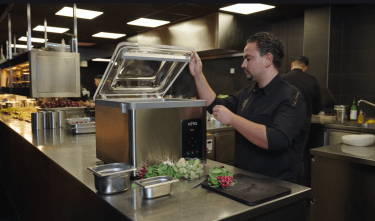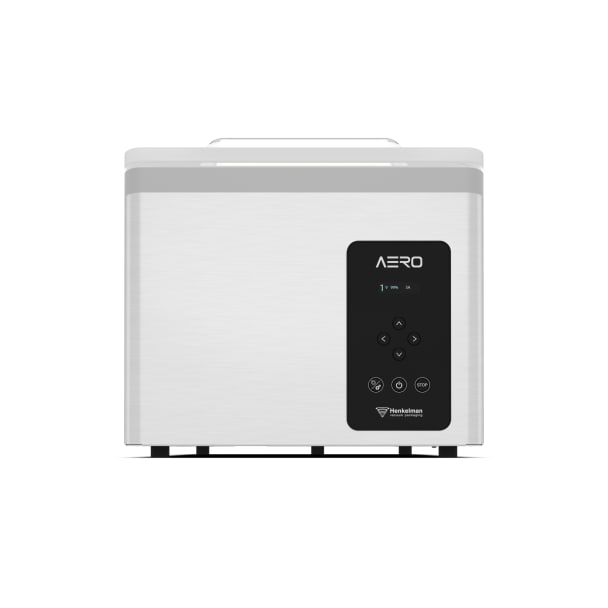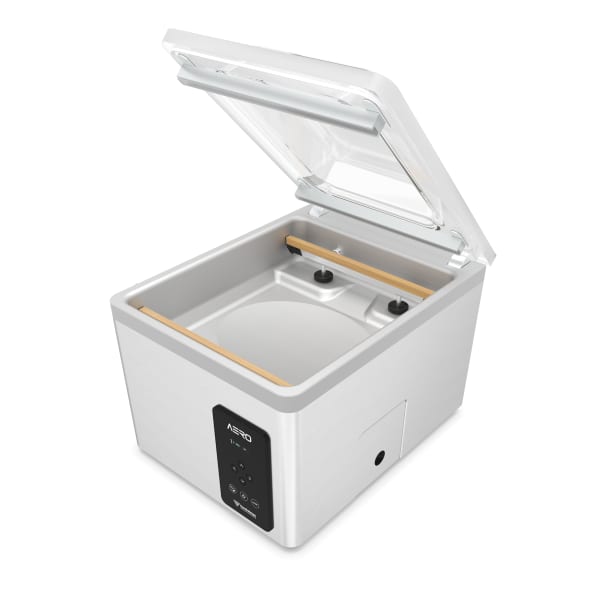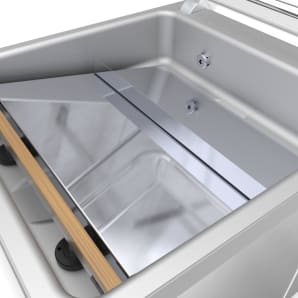
The Henkelman vacuum packing process
For perfect results, always follow the five-step Henkelman vacuum packing process.
To create a maximum and deep vacuum, you need a professional chamber vacuum packing machine with a high quality, powerful pump. This ensures that almost all the air is extracted from the bag and the product, creating a perfect final vacuum result of 99.8%. This ensures that the food products have a much longer shelf life and that non-food products are protected from external factors. For perfect results, always follow the five-step Henkelman vacuum-packing process.
Step 1: cool products
Almost all food products, but also non-food products that have been lubricated with oil, contain liquid. When the pressure in the chamber drops, the boiling point temperature of these liquids also drops. If it reaches a temperature that is lower than that of the product, it will start to boil. It is therefore important to refrigerate your products before packaging. Preferrably to a temperature of between 2 and 4 °C. This ensures that you will achieve a perfect end result. If your product is too warm, the process stops before this stage is reached, resulting in a less than optimal vacuum result.

Step 2: air extraction
Once you have chosen the correct program and closed the lid, the vacuum process begins. In concrete terms, this means that the machine extracts all air from the bag, the product and the chamber so that the desired vacuum result is achieved or until the boiling point of the liquids has been detected.

Step 3: gas flushing (optional)
Before the bag is sealed, a preservation gas can be added. This extends the life span of the food and helps maintain the shape, color, structure and quality of the product. Gas flushing is ideal for sliced products such as fruit and vegetables.

Step 4: bag sealing
When all the air has been extracted and gas has been injected if required, the bag is sealed. This ensures that the product is protected against external factors. You can choose the right sealing system to suit the type and thickness of the vacuum bag. Henkelman machines are fitted with a double seal, but you can also opt for a cut-off or wide seal. Or, depending on the model, bi-active seal, 1-2 cut-off seal.

Step 5: aerate chamber
The final step in the vacuuming process is removing the vacuum from the chamber. This is done simply by introducing air back into the chamber through the aeration valve. Once the pressure in the chamber is equal to the pressure outside the chamber, the lid opens. If you are using the soft-air option, this step takes place gradually to prevent sharp objects from tearing through the bag or crushing a soft product.
Good to know if you are vacuum-packing

Gas Flush / MAP packaging
Extends the shelf-life and protects vulnerable products from distortion and discoloration through the addition of preservative gas

Liquid Control
Stops the vacuuming process when evaporation is detected. This prevents contamination of the chamber, oxidation of the pump, and dehydration and loss of weight
Soft air
This enables the optimal vacuum packing of sharp or sensitive products without damaging the product or vacuum bag.

Pump cleaning program
Moisture is sometimes released during the process. This collects inside the pump. The accumulation of this moisture leads to corrosion which is harmful to the pump. Every Henkelman machine automatically indicates on the display when it is time to use the pump cleaning program. The pump is heated and ventilated for five minutes, ensuring moisture to evaporate.
Frequently asked questions
Each product and/or vacuum bag needs its own program to achieve a specific result. With more program memory, you can save these settings for each product or type of bag. The programs are therefore consistent, and you do not have to reconfigure them.
Vacuum packing results in a longer shelf life. This is because the oxygen is removed during the vacuuming process. This slows down the ripening process. The vacuum bag also gives your product air and liquid-tight protection against external factors.